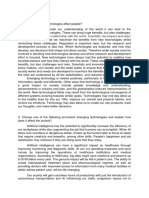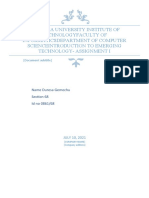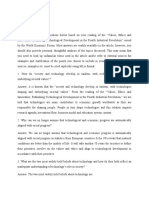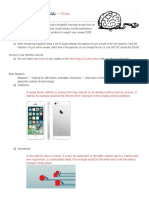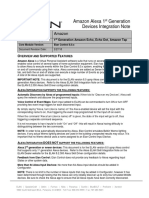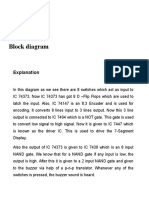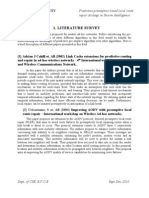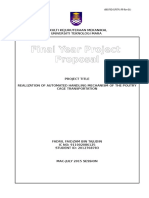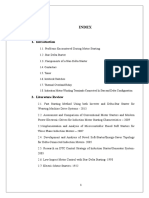Gracel Grace Inocillas 1st Year BSCRIM
HW1
Q1:
1. Data Privacy: Imagine if every website you visited, every app you used, and
every device you owned could track your every move and store all your personal
information. That's a lot of data! Data privacy means making sure that companies
and governments use this data responsibly. We want to know what information is
being collected, how it's being used, and be able to control it. We don't want our
information being sold or used in ways that hurt us or violate our privacy.
2. Risks of AI: AI is like a powerful tool, but it needs to be used carefully. AI systems
can be trained on data that might contain biases, leading to unfair or discriminatory
outcomes. For example, an AI system used for hiring might unfairly favor candidates
from certain backgrounds. We need to make sure AI is fair and unbiased, and that
we understand how it makes decisions.
3. Sustainable Environments: Building and using technology takes a lot of
resources like energy, water, and materials. If we're not careful, technology could
harm the environment and contribute to climate change. We need to find ways to
make technology more sustainable, using less energy and resources, and
minimizing our impact on the planet.
4. Health Implications: Spending too much time on screens, using social media,
and being constantly connected can be bad for our physical and mental health. We
need to be aware of these risks and make sure technology is used in a way that
promotes our well-being. We need to find a balance between using technology and
taking care of ourselves.
5. Infodemic and Data Weaponization: We live in a world where misinformation
spreads very quickly online. Fake news and propaganda can manipulate people and
influence elections. We also need to be careful about how data is used. Data can be
used to target individuals with specific messages, manipulate their opinions, or even
harm them. We need to develop ways to combat misinformation, promote media
literacy, and ensure that data is used ethically.
Q2:
1. Fairness
2. Safety
3. Accountability
4. Privacy
HW2
�My 3 Learnings from the Article
Many of the greatest inventions were the result of incremental improvements
by many innovators over time, building upon each other's work. Lots of great
inventions weren't made by just one person. They were built on ideas from
many people working together over time. The printing press, which started as
a simple idea and was improved upon by many inventors over centuries,
leading to the mass production of books.
The printing press enabled the mass production of books, which in turn led to
increased literacy and a wider spread of knowledge, ultimately fueling further
innovation. When people can easily share knowledge (like with the printing
press), everyone learns more and new ideas are born. More knowledge
means more innovation and progress.
Many of the inventions on the list, like the computer and antibiotics, were
based on fundamental scientific discoveries made centuries earlier,
highlighting the long-term impact of basic research. Many of the greatest
inventions weren't just random ideas. They were based on scientific
discoveries that happened long ago. Science is the foundation for technology.
HW3
Understanding the whale's biology (its size, vulnerability in shallow water) was
crucial to the rescue. This knowledge allowed rescuers to make informed decisions
about how to approach the situation and what resources were needed. The use of
backhoes and boats demonstrates how technology can be applied to aid in animal
rescue efforts. This equipment provided the necessary power to move the whale
back into deeper water.
This story highlights the power of collective action. Hundreds of people came
together, driven by empathy and a desire to help. This collaborative effort made the
successful rescue possible.
This story emphasizes the way science, technology, and society work together.
Scientific knowledge informed the rescue strategy, technology provided the tools,
and the collective will of the community made the effort a success.



















